A secretive VIP jet charter business that may have helped officials flee Ukraine as the government of Viktor Yanukovych collapsed appears closely linked to the business empire of current Ukrainian President Petro Poroshenko.
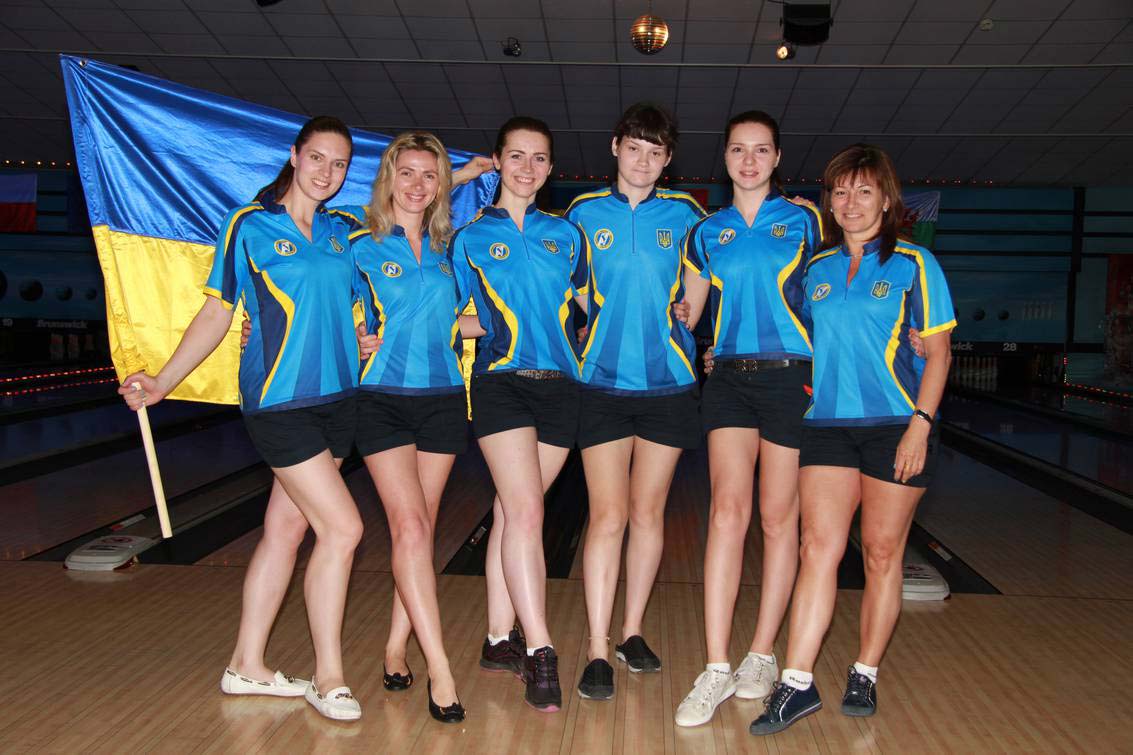 Business Airlines flew Liliia Kononenko, right, and fellow members of Ukraine’s national 10-pin bowling team to tournaments. Kononenko’s husband is a business partner of President Petro Poroshenko.
Business Airlines flew Liliia Kononenko, right, and fellow members of Ukraine’s national 10-pin bowling team to tournaments. Kononenko’s husband is a business partner of President Petro Poroshenko.
The trail of documents connecting the little-known Business Airlines to Poroshenko involves an offshore money-laundering investigation and an unlikely cast of characters: old university friends, a 10-pin bowling enthusiast and a Ukrainian woman who ran a high-end boutique airline despite no apparent credentials for doing so.
Yaroslav Yurchyshyn, executive director of Transparency InternationaI Ukraine, told OCCRP that the elaborate web of offshore corporations and activities uncovered by OCCRP reporters likely has a dual motive.
“In our view, the key motive here is tax reduction using the British Virgin Island’s zero profit tax,” Yurchshyn said. “But hiding (the company’s true) ownership may have been an additional motive.”
The origins of the web connecting Poroshenko to Business Airlines stretches back nearly 30 years to the Taras Shevchenko University in Kyiv, where in 1989 a young Poroshenko studied in the Faculty of International Relations and Law with a student named Serhiy Zaitsev.
Poroshenko eventually hired Zaitsev, who rose through the ranks to become one of the top managers of Roshen Confectionary, Poroshenko’s profitable candy business.
According to a 2015 investigation of Intraco by the Financial Investigation Agency of the British Virgin Islands Zaitsev has other, murkier connections to Poroshenko’s business empire. To understand what investigators have uncovered requires a look at the global criminal services industry that flourishes in more than 130 “offshore” tax havens around the world.
Thinking way, way ahead
The first stage of the investigation involves a company called Intraco Management Ltd., born 14 years ago in the murk of a notorious tax haven.
In 2002, a Panama-based legal firm called Mossack Fonseca created Intraco Management and a group of paper corporations in the British Virgin Islands (BVI). Intraco Management was created as a “shelf company”. The creation of the BVI shelf companies is a routine service provided by Mossack Fonseca for its wealthy clients. A common technique for hiding money is to switch its ownership rapidly among a large number of offshore corporations that exist only on paper; companies like Mossack Fonseca keep a number of such companies aging on the shelf until needed, so they would appear to be legitimate companies in business for some years when they were finally used. Mossack Fonseca went on to become known world-wide in 2016 when its internal documents were released to the German newspaper Süddeutsche Zeitung as the Panama Papers, 11.5 million documents detailing how some among the global elite sought to avoid taxes and hide illicit wealth. The records detailing the transaction were shared with OCCRP by the International Consortium of Investigative Journalists (ICIJ).
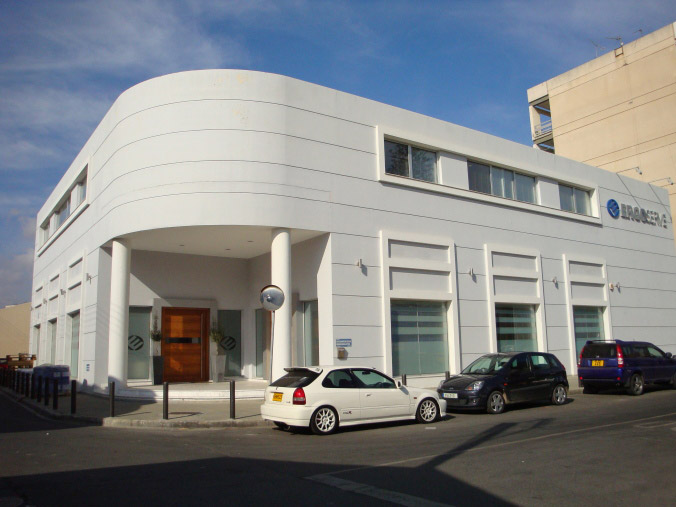 Geoffrey Magistrate’s office in the tax-haven island of Cyprus.Three years later, a group of such shelf companies sprang to life. In July 2005, Geoffrey Magistrate, a Cyprus company services provider affiliated with Mossack Fonseca, bought up the batch: Parkside Consulting, Euro Business Investment, Linquist Services, Brackley Group and Intraco Management Ltd. The ostensible owners of these companies were Cypriot “proxies” or front men; it is unknown who were the beneficial owners.
Geoffrey Magistrate’s office in the tax-haven island of Cyprus.Three years later, a group of such shelf companies sprang to life. In July 2005, Geoffrey Magistrate, a Cyprus company services provider affiliated with Mossack Fonseca, bought up the batch: Parkside Consulting, Euro Business Investment, Linquist Services, Brackley Group and Intraco Management Ltd. The ostensible owners of these companies were Cypriot “proxies” or front men; it is unknown who were the beneficial owners.
Ten years after that, on Oct. 2, 2015, alarm bells rang in Magistrate’s office: the BVI Financial Investigation Agency (FIA) had launched an investigation into Intraco Management on suspicion of money laundering. Agents filed a request to Mossack Fonseca for full information about Intraco’s “beneficial ownership” – the hidden people behind the company –and its bank accounts.
But there was something very curious about the sequence of events in the FIA investigation.
The letter sent by the FIA warned Mossack Fonseca against tipping off its customers about the investigation. To do so would constitute a criminal offense. But the FIA letter that Mossack Fonseca received on Oct. 2 was post-dated Oct. 16, giving Mossack Fonseca and Magistrate ample time to take preventive action before theinvestigation officially began.
Magistrate filed for dissolution of Intraco Management that same day, Oct. 2. – a move that presupposes permission from the real owners. Then he filed information on ownership and finances of the company as requested by FIA.
Magistrate drew up and signed the forms specifying Intraco’s ownership on the same day Oct. 2, post-dating the form to Oct. 15, 2015.
The form named Zaitsev, Poroshenko’s acquaintance and top employee.
Yet the form contained puzzling errors. Magistrate said Zaitsev was a Ukrainian citizen, but spelled his first name incorrectly, using a ‘g’ as Sergei while the correct transliteration of the Ukrainian name in a passport would use an ‘h’ — Serhiy.
This suggests that when Magistrate filed the form, he did not have a copy of Zaitsev’s passport in front of him – odd if Zaitsev was already on file as owner of the company. Magistrate also failed to provide a date of birth for Zaitsev.
And finally, the address for Zaitsev provided in the papers, 29a Elektrikiv Street, is not Zaitsev’s home address, but the address of Poroshenko’s business headquarters.
 29a Elektrikiv Street in Kyiv, home to Business Airlines and the Ukrainian Association of Ten-Pin Bowling. It was also the address for Ukrprominvest, President Poroshenko’s industrial conglomerate, before its dissolution in 2012.
29a Elektrikiv Street in Kyiv, home to Business Airlines and the Ukrainian Association of Ten-Pin Bowling. It was also the address for Ukrprominvest, President Poroshenko’s industrial conglomerate, before its dissolution in 2012.
On October 6, Mossack Fonseca sent Magistrate forms and payment request to commence the dissolution process.
On October 20, Magistrate sent the completed full application for liquidation to Mossack Fonseca. Some of the data Magistrate filed was false. He stated that Intraco Management “has never had a bank account.” Yet documents seen by OCCRP show that in reality large volumes of cash flowed through an Intraco Management bank account at Austria’s Raiffeisen International.
Under BVI law, companies can only be dissolved if they are in “good standing,” so the advance tip-off meant the dissolution process could start before the investigation began. Intraco was officially dissolved on Dec. 1, 2015, which indeed preempted the FIA investigation.
When OCCRP asked Magistrate about these contradictions, he said only, “We don’t discuss anything about our company or clients.” He would not say if he was personally acquainted with Zaitsev, and hung up.
VIP planes
Zaitsev, too, declined to speak to OCCRP about Intraco Management.
But in May 2016, in an interview with the news service Interfax Ukraine he was asked directly whether he created Intraco for Poroshenko, and if the president was the real owner.
“No, it is not true,” [that he holds the company for Poroshenko] he said. “I have, and had, my own business interests and projects, for which I have set up a number of companies.”
Yet Ukraine’s company register does not show Zaitsev to be founder of any local businesses. The records indicate that Zaitsev does hold shares in Poroshenko’s holding company for Roshen, the Central European Confectionary Plant. He and three other top managers received a 0.5 percent stake in it in 2014 as a bonus.
Zaitsev is known to represent Poroshenko’s interests. For instance, in 2013 he featured in security market filings as representative of Vernon Holdings Ltd., an offshore vehicle Poroshenko used to hold a controlling stake in Crimean ship repairers Sevastopol Morskii Zavod.
Thanks to a new law that took effect in April 2015 in Ukraine, political figures now face criminal prosecution if they fail to fully disclose their properties and ownership stakes. This law applies to Poroshenko and such political lieutenants as Ihor Kononenko, an ally and high official in the president’s party, the Petro Poroshenko Bloc Solidarity.
Neither Poroshenko nor Kononenko has declared any interest in Intraco.
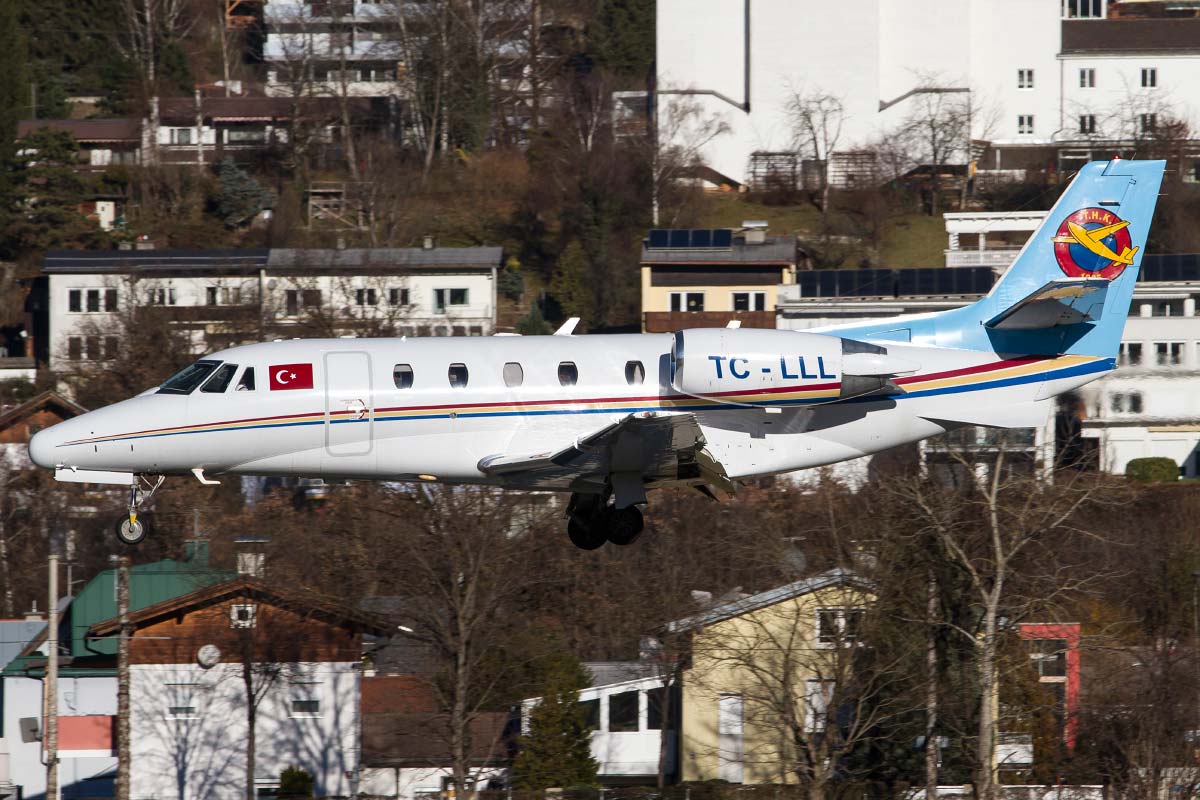 TC-LLL seen in Italy.
TC-LLL seen in Italy.
Links between Intraco, Business Airlines and Poroshenko
Internal Intraco documents, obtained by OCCRP reporters, show that Intraco handles things such as international payments for fuel and airport fees for Business Airlines. Zaitsev does not appear anywhere in those records.
Ukraine’s corporate register indicates Business Airlines is owned and managed by a Ukrainian woman named Darya Tsaregorodtseva, an accountant who is also an Intraco director. The Business Airlines website was taken down in 2015 for unknown reasons, but a cached version says it operates a fleet of 16 executive jets based in Kyiv and Moscow.
The most recent records available indicate the VIP charter business has millions of euros in annual turnover. Between 2009 and 2011, the business took in more than €15 million via Intraco, according to documents seen by OCCRP.
The cached website shows Business Airlines headquartered at 29a Elektrivkiv Street, the same address provided for Zaitsev in Intraco’s files. It’s also the former headquarters of Ukrprominvest, the industrial conglomerate founded by Poroshenko, as well as Poroshenko’s holding company, Prime Assets Capital Management.
The property is owned by the Monitor sports club; Poroshenko owns 55 percent of Monitor via Prime Assets Capital, his holding company for assets other than Roshen. The remainder is owned by Ukrprominvest co-founders Kononenko and Oleh Gladkovsky.
The Ukrprominvest consortium was dissolved in 2012, but many of its former component parts remain headquartered here, such as car-and-bus-maker Bogdan Motors Corporation, now under sole control of its former CEO Gladkovsky, who is now the first deputy head of Ukraine’s Defense and Security Council. The Soviet-era Leninska Kuznya shipyards, co-owned by Poroshenko and Kononenko, is historically based at this address on the banks of the Dnipro River that flows through Kyiv.
The address also hosts the 5th Element elite fitness club, owned by Poroshenko and Kononenko, as well as the honorary consulate in Ukraine of the Seychelles Islands, run by honorary consul Gladkovsky (who used to go by the family name Svynarchuk).
Last but not least, this is the address of the Ukrainian Association of Ten-Pin Bowling, of which Kononenko is president. His wife, Liliia, is a member of the national team.
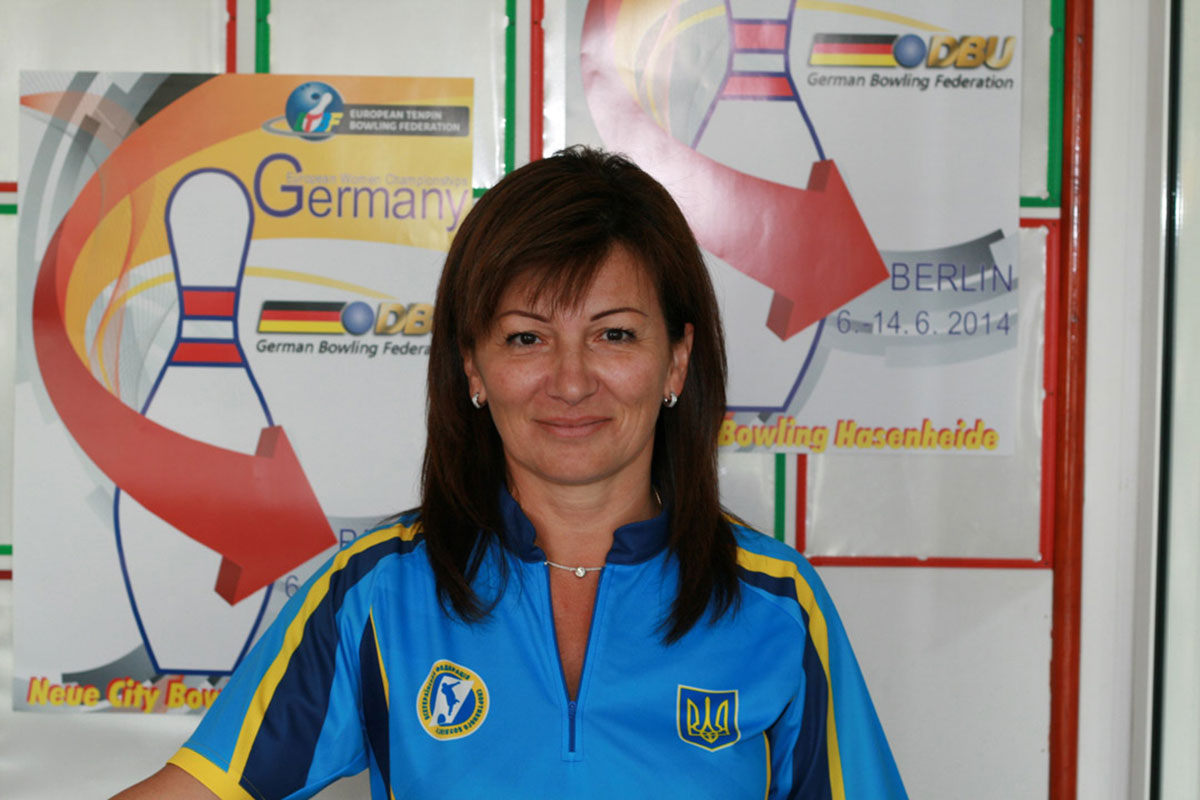 Liliia Kononenko, a champion bowler whose husband, Ihor, is a business partner and political ally of President Poroshenko.
Liliia Kononenko, a champion bowler whose husband, Ihor, is a business partner and political ally of President Poroshenko.
When OCCRP reporters visited the address, a Mercedes used by Poroshenko’s father Oleksiy, who runs the Poroshenko family business, was parked there. The driver and guards were not happy to see journalists, andsuggested OCCRP leave without filming the car.
Hidden owners?
Another connection between Intraco, Business Airlines, and Poroshenko’s Ukrprominvest is the email address used by Tsaregorodtseva, which uses the Ukrprominvest domain upi.com.ua. A second Business Airlines manager, head of sales Andrei Aleynikov, also uses an address with the same domain name.
Many of Business Airlines’ 16 planes appear in the Intraco documents. But Zaitsev has no relationship on paper to Business Airlines, despite his purported ownership of its offshore affiliate Intraco.
Tsaregorodtseva owns no other businesses in Ukraine, and has no public profile OCCRP can find. A receptionist told OCCRP reporters last September that Tsaregorodtseva “is currently on maternity leave”. When OCCRP reached Tsaregorodtseva by telephone, she said she had worked at Business Airlines at one time, and had heard of Intraco Management “from the news.” She hung up when asked whether she knew Zaitsev.
Financial links
Other records link Business Airlines to Poroshenko’s business empire. At least one of the planes, a Cessna Citation Sovereign, registration OE-GBY, was owned by Ukrprominvest Group, via Austria’s Raiffeisen Leasing,according to documents dated 2011.
This means Ukrprominvest owned the plane under the terms of a loan from Raiffeisen. The Cessna documents list Tsaregorodtseva as primary point of contact for the plane, which features in both the Intraco documents as well as the Business Airlines catalogue of planes.
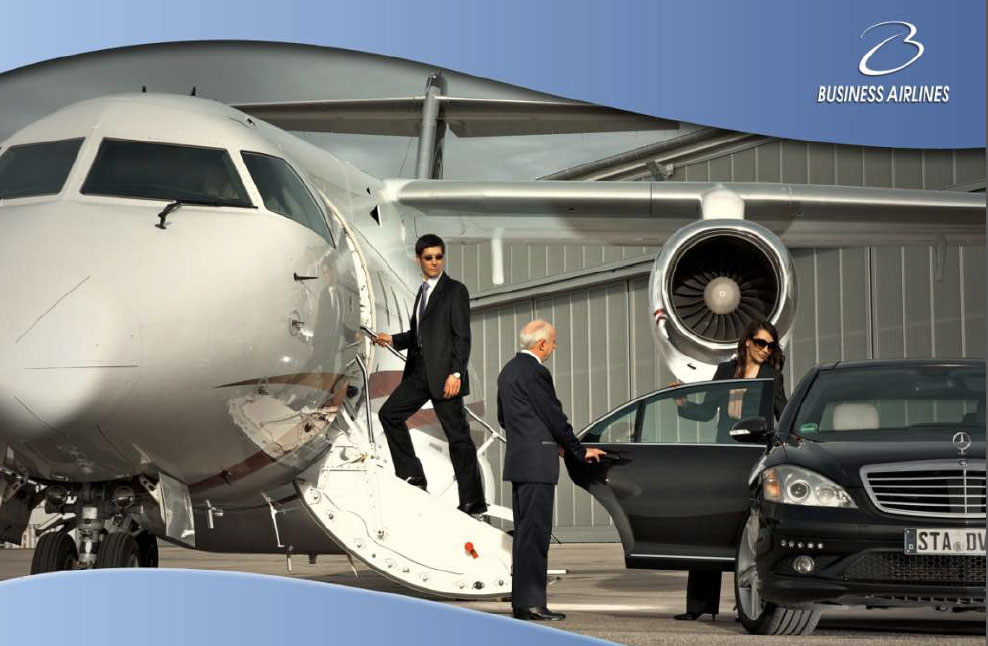 A photograph from the catalogue of Business Airlines, originally linked to the company website but subsequently taken down.
A photograph from the catalogue of Business Airlines, originally linked to the company website but subsequently taken down.
Reporters were also able to view the loan and deposit books of International Investment Bank (IIB), a small bank owned by Poroshenko and Kononenko that serves the business of the president and his partners. As of mid-2016, the books show Business Airlines to be the bank’s largest borrower, with almost UAH 120 million in loans (now around US$ 5 million, but worth about $14.5 million before the major devaluation of the currency in 2014).
Intraco does not feature in the accounts, as it was dissolved in 2015. But Linquist, one of the sister companies of Intraco administered by Magistrate, is among the top 15 largest depositors of IIB.
The leaked Intraco documents also show Poroshenko and Kononenko to have frequently flown in the business’ charter jets. Zaitsev acknowledged in the interview that Poroshenko had flown with Business Airlines, once even after his election as president.
The documents also suggest that Intraco has close links with the Kononenko family. Intraco paid invoices relating to the Kononenko family’s European trips, most notably for participation in ten-pin bowling tournaments.
Secret society
Why such secrecy surrounding the airline?
Between 2010 and 2014, Business Airlines transported many top officials in the Yanukovych administration who have since seen their assets frozen or arrest warrants issued for alleged major corruption during their time in power. Some paid cash for their flights.
The documents list only last names of clients. The list includes Klyuev, Azarov, Katsuba, Lyovochkin, Bogatyrova, Salamatin and Kalinin–all names which match high-ranking Yanukovych cronies, ranging from prime minister, to head of the national bank, head of the security council, head of the presidential administration, defence minister and head of the security service.
Tsaregorodtseva denied that Business Airlines had arranged charters for these individuals. Yet Oleksandr Katsuba, a former deputy head of the state energy company Naftogaz, confirmed to OCCRP reporters that his family had flown on planes chartered using Ukrprominvest as intermediary.
Bloodied hands
Business Airlines flights, usually limited to around one a day, began to spike on Feb. 20, 2014, after police had gunned down anti-Yanukovych demonstrators in the heart of Kyiv. Two days later, Yanukovych himself would flee Ukraine.
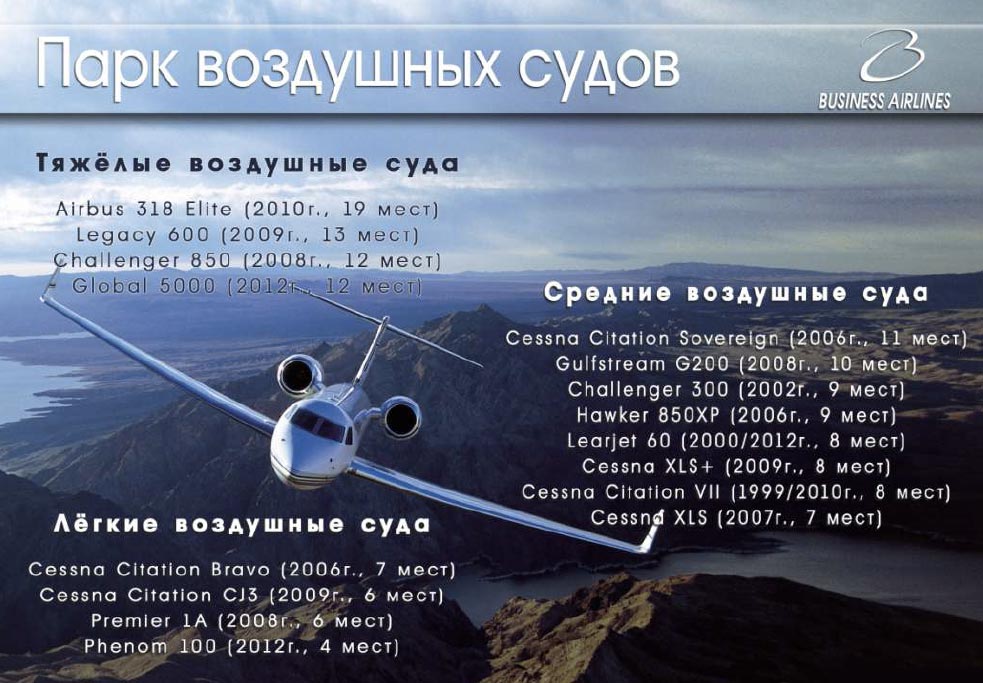 Data on some of Business Airlines’ high-end equipment, also from the company’s catalogue.
Data on some of Business Airlines’ high-end equipment, also from the company’s catalogue.
According to flight data provided to OCCRP by Ukraeroruk, Ukraine’s flight control authority, between Feb. 20-24 Business Airlines planes jetted back and forth from Kyiv to Donetsk, Yanukvych’s stronghold, as well as to destinations in Russia, Europe and further afield:
- A Cessna XLS with registration number TC-LLL flew from Kyiv’s Zhulyani airport to Donetsk on Feb. 20 at 11:30 am. It then flew back to Kyiv, from where it flew to Russia’s Sochi and back. On the following day it made two more return trips between Kyiv and Donetsk.
- Also on Feb. 20, OE-IDB, an Embraer Legacy 600 jet, flew at 10:55 am from Kyiv’s Zhuliany to Donetsk, back to Kyiv, and then to Donetsk again at 5:25 pm. A Gulfstream 200 jet, OE-HAS, flew Kyiv-Donetsk at 11 pm on Feb. 20, then again at 4 am on Feb. 21 and at 5 am on Feb. 22.
- The Ukrprominvest-owned Cessna OE-GBY flew from Kyiv to Barcelona on Feb. 20, then to Sharm-el-Sheik, Catalonia, Nice and Vienna over the next two days, each time returning to Kyiv.
- Another Business Airlines plane attracted attention on Feb. 21, as the news spread that Yanukovych had fled Kyiv. The Airbus 318 Elite, with capacity for 19 in a luxury-fitted cabin, took off from Kyiv towards Russia’s Sochi. This prompted suspicions that Yanukovych was trying to join the Kremlin camp in Sochi attending the Winter Olympics. But the plane then swerved before crossing into Russia, and flew instead to Dubai.
The planes made a total of 26 flights out of Kyiv between Feb. 20 and 24; 13 were to Donetsk, and 5 to Russia. It is unknown who was aboard.
Moscow-bound
Following Poroshenko’s election as president in May 2014, four of the 16 planes in the Business Airlines catalogue were listed as based in Moscow. In 2015, the Business Airlines website was taken down, but the business continues to operate, although scaled down.
In fact, Business Airlines still provides charter flights to Moscow, although direct links with Russia are banned under sanctions imposed by Poroshenko in retaliation for Russia’s backing of separatists in East Ukraine.
“It is possible to fly directly [to Moscow] but it requires permission from Russia’s Federal Security Service,” a Business Airlines employee told OCCRP reporters by phone. They advised an easier option: fly via Belarus, with a stopover of 15 to 20 minutes in the Belarus town of Gomel, at a total cost of $14,000 to $17,000.
In the fall of 2014, Intraco bought aviation fuel from the Kremlin-owned oil firm Gazpromneft, apparently in connection with the Moscow business. In the May 2016 interview, Zaitsev said that Intraco had on two occasions bought a total of 7 tonnes, “enough for 6-7 hours of flying.”
But in fact, Intraco bought 1,000 tonnes of aviation fuel from Gazpromneft, according to the trade database Importgenius. Oleksandr Pavlenko, a former Business Airlines employee, told OCCRP that this volume of fuel would be enough for “one plane for two years.”
“I am involved in business, not politics,” said Zaitsev in the interview. But the VIP jet business seems to be built on politics.






